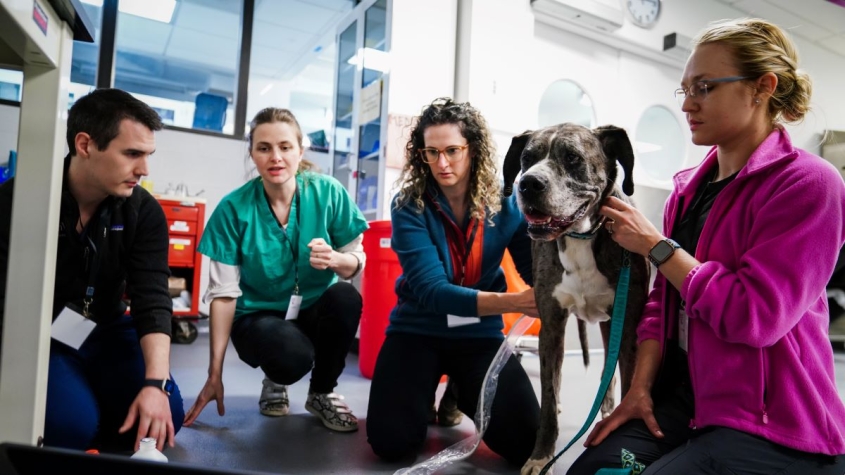RECOVER Initiative unveils major updates to veterinary CPR guidelines, elevating emergency care for pets
In a significant leap forward for veterinary care, on June 26 the Reassessment Campaign on Veterinary Resuscitation (RECOVER) Initiative unveiled the first major revisions to its global veterinary cardiopulmonary resuscitation (CPR) guidelines since 2012, setting new life-saving standards based on groundbreaking scientific advancements and extensive community feedback. The initiative is led by three co-chairs, including Dr. Daniel Fletcher, associate professor of emergency and critical care at the Cornell University College of Veterinary Medicine.
These guidelines are the definitive CPR guidelines for veterinary health professionals worldwide. “The publication of these new guidelines represents a pivotal event in veterinary resuscitation science,” says Dr. Manuel Boller, adjunct associate professor of veterinary emergency and critical care from the University of Calgary, specialist in veterinary emergency and critical care at VCA Canada and co-chair of RECOVER. “These updates incorporate new scientific evidence, feedback from the veterinary community, and the latest advancements, directly enhancing how we perform life-saving CPR on pets.”
Key updates and their rationale
The revised guidelines, which introduce essential changes that reflect the latest in veterinary science and practice, are available in an open-access issue of the Journal of Veterinary Emergency and Critical Care and at the RECOVER Initiative website (recoverinitiative.org).
Key updates include:
- Chest Compression Techniques: Enhanced methods for cats and small dogs to optimize survival during cardiac arrest.
- Compression Depths and Techniques: Adjustments tailored to an animal's size and chest shape, improving CPR effectiveness.
- Breathing Support Methods: Revised for non-intubated patients, focusing on rescuer safety.
- Medication Dosages and Procedures: Updated for more precise and effective treatment during CPR.
“Thanks to a rigorous review of over 1,370 studies by 102 volunteer evidence evaluators, these updates embody our commitment to the highest standards of evidence-based veterinary practice,” states Dr. Jamie Burkitt, associate professor of emergency and critical care at the UC Davis School of Veterinary Medicine and co-chair of RECOVER.
A new streamlined CPR algorithm, updated drug dosing charts and an ECG diagnosis algorithm will standardize CPR practices globally. The enhanced RACE-approved training courses, developed by the Cornell University College of Veterinary Medicine in collaboration with the RECOVER Initiative, are set to equip over 350 RECOVER Certified Instructors worldwide to train veterinary professionals to perform these life-saving techniques. To date, over 85,000 veterinary health professionals have taken the RECOVER online CPR courses and over 20,000 have attended in-person CPR Rescuer workshops.
Experts worldwide and across disciplines collaborated on developing the treatment recommendations. “The 2024 RECOVER CPR Guidelines are the first veterinary clinical guidelines developed using a rigorous process known as GRADE. Most human clinical guideline organizations use this approach, including the International Liaison Committee on Resuscitation, which produces human CPR guidelines. We’re proud to continue RECOVER’s commitment to the highest standards for clinical practice across all species and are so grateful to the volunteers who helped make this happen,” explains Dr. Daniel Fletcher, co-chair of RECOVER.
The primary goal of the RECOVER 2024 CPR Guidelines is to improve CPR outcomes in veterinary patients, mirroring the advancements seen in human medical care through the broad acceptance of evidence-based CPR guidelines. These guidelines, training courses and an official certification process underscore the importance of preparedness in emergency situations, particularly in general practice settings where reversible causes of cardiopulmonary arrest, such as anesthesia-related issues, present opportunities to save lives.
The RECOVER Initiative calls on veterinary professionals and pet owners alike to embrace these updated guidelines immediately. Adopting these practices is crucial to enhancing acute care outcomes for our beloved pets, ensuring the best possible results. Further guidelines on Newborn Resuscitation, Prevention and Preparedness and First Aid are expected in the near future.






